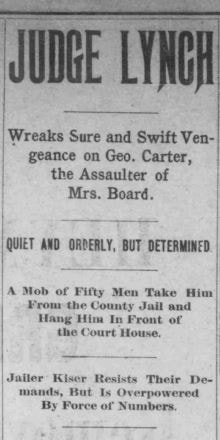 A headline from The Bourbon News, February 12, 1901 A headline from The Bourbon News, February 12, 1901 This week our dark times got darker. Over the month of May—still sheltered in place or cautiously emerging into society while simultaneously mourning the 100,000 Americans who have died from COVID-19—we have learned of three American citizens killed, needlessly, inexplicably, by police or those assuming law enforcement duties. All the victims were black. All the perpetrators were white. Will this outrage never end? The rage incited by these events has engulfed our cities. Protestors have blanketed the streets. Some agitators have destroyed property, burning and looting businesses with no association to the injustice. A response that initially felt rational now feels insane. In the midst of all this horror, another related story caught my attention. On Monday in Central Park, a 57-year-old birder asked a woman walking in the wooded Ramble area to leash her dog, as the area requires. She refused. As he calmly offers the dog treats in an effort to convince her to control her dog, she accuses him of threatening her and says she will call the police. With that, he takes out his phone and begins to record the incident. The woman, who is white, then calls 911 and tells the dispatcher, in an increasingly hysterical voice, that she is being threatened by an African American man. (CNN story) We all know of famous incidents in our nation’s history where a false accusation from a white woman cost a black man his life. But how many others, never reported or denied by those in power, stain our past? Today we’re finding that an immediately accessible recording device may be the only way for the black victim to get justice, even if it’s posthumously. In the Central Park instance, which thankfully did not go that far, the man and the woman actually have a lot in common. They’re both sophisticated New York City dwellers who take advantage of the beauty of Central Park. They’re both highly educated—he at Harvard, she at the University of Chicago. They’re both successful in their fields. They even share the same last name (although they are not related). But Amy Cooper felt that her whiteness gave her tremendous power over Christian Cooper. And she decided to use that power. If he had not recorded their interaction, she very well may have succeeded in having him arrested for a fabricated crime. And convicted. Because of his skin color. As I worked on Next Train Out, I had to wrestle with my own family’s story of a white woman’s alleged assault leading to a black man’s death. The only information I have about the incident is what was reported in the local and national newspapers, during a time when purple prose and editorializing were evidently acceptable. None of the news articles offers any details that might indicate that what happened should have been a capital crime. The only witness was an eight-year-old boy, my grandfather. In my fictional telling of the story, I chose to assign him the natural empathy and compassion of a human innocent, someone not yet indoctrinated into the mores of his community’s power brokers. Over our long and tortured history, I suppose we humans have always sought to subjugate others. To demonstrate power through domination. To cover up weakness by claiming the upper hand. At risk of repeating a tired refrain, this has to end. We must stop snuffing out the lives of others simply because we deem ourselves superior. The color of our skin does not grant us that privilege. We have to be better.
2 Comments
6/1/2020 09:08:50 pm
Just finished reading "Last Train Out" which brought up a few random thoughts which happen to be addressed in this blog also. When I read about Mr. Kiser of Stoner Creek, I thought you just knew about my Kiser roots and then threw that name in there for the fun of it. then, I read this lynching article that named Mr. Kiser as the jailer that got overrun by the mob.Crazy way that you connected me to a time in my ancestors' lives that I couldn't have imagined.
Reply
Sallie Showalter
6/1/2020 10:06:23 pm
Tricky devil, aren't I, Ed? I would love to discuss more of your thoughts about the book, especially given your roots in Bourbon County. Thanks for reading!
Reply
Your comment will be posted after it is approved.
Leave a Reply. |
Details
Archives
June 2023
Categories
All
|


 RSS Feed
RSS Feed